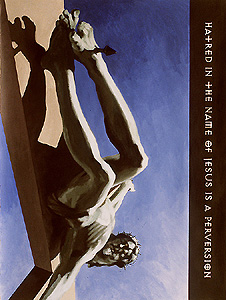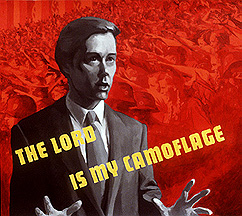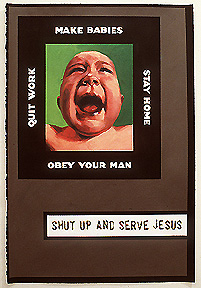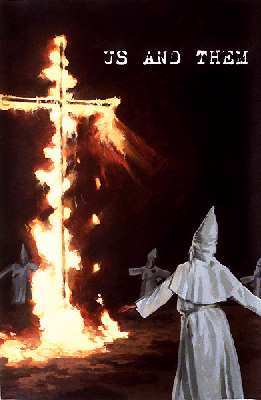|
1961-2000: Jewish-American artist Lilith Adler died at the height of her artistic career.
She left behind a collection of her more famous art pieces (the more controversial ones), and with them she left behind writings/musings on individual pieces and topics. In life she was a staunch supporter of people thinking for themselves (as opposed to religious/racial brainwashing), lesbian/gay marriages, feminism and women's rights. Below is a collection of individual comments that she made about her art pieces (mini artist statements), and additional art pieces related to the same topics. |
|
Enforcement. Acrylic on paper, 16.5" x 30.375" ©1996 Lilith Adler. All rights reserved. Of course this image is obscene. It's not intended to be erotic. I painted it to talk about the role of sex in power dynamics. The real question is why is it obscene. Although images of nude women are ubiquitous in Western art, there are relatively few corresponding images of nude men. Of these, most follow the convention established by the Greeks that if a man's penis must be rendered in art -- that is, if it cannot be hidden by cloth or clouds or flying putti -- it must be shown baby-sized. The rule is very strict. Mapplethorpe broke this rule -- for instance, his Man in the Polyester Suit shows a crotch shot of an enormous black dong sticking out of a fly, and while the blackness of the penis brings up a whole set of other issues, the fact that Mapplethorpe trod on this forbidden ground pushed some people's buttons in a big way. It made him a pariah and to the new Right, a symbol of what is wrong with art today. I think this hysteria (if I may borrow the word from its etymological description of women) at the sight of an erect male penis has everything to do with men's fear of rape. Now, I've asked men about this. They each categorically denied entertaining any such fear. But a couple of years ago, I saw an article in the Boston Globe about men raped in prison. On describing his experiences, one prisoner said, "It made me feel they could do anything to me they wanted. It made me feel like a woman." Well that stuck in my mind. The extent to which men fear rape is evident in their curses. Most obvious is "Fuck you," where the "I" is understood: "I fuck you" or "I fuck you over". It brings to mind natural history, since this behavior is commonplace among many social mammals. You have just to go to a park to see dominance rituals among dogs: one male will hump another and thereby establish himself as literally a "top dog". So the object of the game is to be the top dog. A subtlety of this is the expression "blow me!", which intimates that the man being serviced "has it over" the man performing the service. The expression "I really got fucked" means I got a raw deal: I was the fuckee, not the fucker. To be the fucker is to be in power. To be the fuckee is to submit. Sweet submission. Expected behavior from women, to seek to be dominated, to enjoy submission. It's in all the songs. A normal woman has been socialized to be masochistic; i.e., neurotic is normal. A woman who is not masochistic just hasn't met the right man yet. Now, the image in this painting comes about of course because I've lived it, but didn't think much of it until I saw an almost identical quote in a copy of the magazine Deneuve. What I had thought was an ideosyncratic, particular experience turns out to be a kind of underground cliché. A lot of women have heard this line, maybe some men but who would admit? So over the years I've given a lot of thought to the idea that a good stiff prick will straighten me out. I've found echoes of it in high literature: Ayn Rand's The Fountainhead, Shakespeare's The Taming of the Shrew. I see it in James Bond movies, Sharon Stone movies. The notion behind it is that if a woman has her own agenda and therefore is not controllable, it is only because she has not found a man dominant enough to master her. Translation, a woman wants to be raped, that tired old saw. With this ideology, sex has nothing to do with love. Its purpose is to enforce and maintain the social hierarchy within a relationship. The missionary subdues the natives, etc. This recontextualizing act which turns a penis from an instrument of affection to one of domination -- from a caress to a bludgeon -- is probably the worst perversion you can have between two people. The iron hand in a velvet glove, so to speak. About once a month a murder case is plastered all over the Boston tabloids. Some man has killed his girlfriend. His wife. There was a restraining order out on him, but the police can only do so much... The situation got so bad that the governor (Weld) instituted some legislation to try to combat this epidemic. But the fact that we had a rash of murders is the logical conclusion of the notion that a woman needs to be dominated, broken, controlled. It's the same impetus that lead John Salvi to shoot up a Brookline abortion clinic. Murder is the ultimate means of control. And that brings me back to my image. You might ask, why did I choose to paint such a handsome man? Well, because he is the romantic hero. He is Cinderella's Prince, Mary Poppins's Bert, the savior who finally came -- the Protector. And what do you do when you find out this is what your Protector is really about? Who will protect you from your protector? You're on your own. |
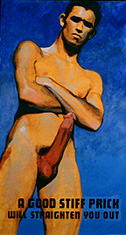 Enforcement/Prick, 1996
|
Rationalization. Acrylic on paper, 30.125" x 22.375". ©1996 Lilith Adler. All rights reserved Other people's faith can be useful, particularly when you have a very slippery agenda. Religion has been used since time immemorial to justify genocide, bigotry, thievery. It's being used right now in the United States to restore the white man to his traditional position as unchallenged head of business and home. It's being used to convince women to quit their jobs and stay home with children so they will be economically dependent on their husbands. Most of the members of these groups are white. Since many of these people also favor laws to deny immigrants rights and end welfare, their motives must be questioned when they say they want to end abortion. It seems that children of color don't matter, while white births do. The spokespeople these movements use are often women, because no one would suspect that one woman would turn against her sisters. It's similar to how Latinos are most often quoted when the media wants to oppose immigrant rights. Religion in and of itself is can be a source of strength and comfort. But when religion is used to obscure an agenda that is basically evil, well let's just say it's sacrilege |
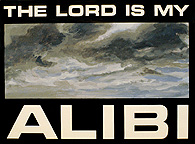 Rationalization - Alibi, 1996
|
Worship. Acrylic on paper, 22.5" x 29". ©1996 Lilith Adler. All rights reserved. I blame it all on Disney. I mean, Peter Pan had Tinkerbell and Wendy at each other's throats, and what kind of prize was he? A guy with a (harumph) Peter Pan complex. As tragic as an Uncle Tom or a Self-Hating Jew is a man-centered woman. Most women have been socialized to be just such an animal. You have been taught, by the likes of Tinkerbell, Snow White's wicked stepmother, and Cruella de Vil never to trust another female, and that your ultimate achievement would be to find some guy whose arm you can ornament. He will be strong and handsome, and he will solve all your problems. The pursuit of your Disneyian hero wastes a lot of energy. It can easily take two hours a day, for instance, to get your hair just so, and maybe he'll admire it and maybe he won't, but wouldn't you really rather be working towards the Nobel Prize? No, instead you work towards his Nobel Prize. "Oh honey, here, I went over your dissertation and don't you think you need just a smidgeon of evidence here to back up your point?" "Ooh, what big muscles! Do it again!" "No honey, it's alright, I don't mind ironing your shirts." And so on. It starts out innocently. A little favor done out of love. What a joy, a gift of your time and talents. You do it again. Pretty soon you remember you used to have your own agenda, but you can't remember what it was or why you wanted to do it. You're spending all your time doing things for us, which translates actually to things for him, because since he makes more money or eventually will make more money, what's good for him is what's good for us. One day you wake up and your whole life is him. His whole life is him. You're not a person anymore, but it doesn't matter, because now you're pregnant, and the rest of your life will be devoted to the service of others. Mazel tov! You're a real woman! | 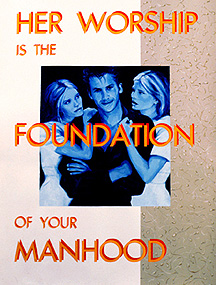 Worship/Manhood, 1996
|
|
| |
Mitzvah. Acrylic on paper, 22.5" x 30". ©1996 Lilith Adler. All rights reserved. A morning blessing in the Jewish Traditional Prayer Book reads, "Blessed art Thou, Lord our God, King of the universe, who has not created me a woman." Easy for you to say. It begs the question, why did it occur to the old yiden who wrote these prayers that this was a blessing to be remembered every day? First thing when you get up? Count yourself lucky, your life could be worse? What was so bad about being a woman? Well, as a woman, you were exempt from religious responsibilities, as were children and Canaanite slaves. Officiating in religious ritual wasn't your job. You were supposed to stay at home, take care of the kids, and make sure all the food was kosher. But in a culture which valued intellectual pursuits above all else and religious pursuits highest among intellectual pursuits, you were pretty well out of it. And how did that happen? How is it women were not allowed to be active participants in religious study and ritual? Blood. The same horror of blood that gave us our kashruth laws generated a horror of woman. If a man were to touch a woman during her menses, he has been rendered unclean until the next morning, the same as if he had touched a corpse. Women and their bodies became associated with corruption and death. And an unclean thing has no place among the holy. It's why it would offend "the honor of the congregation" for a woman to lead prayer. A woman is a dirty, hated thing, that unfortunately is necessary to keep around in order to create and raise sons. Now, the real problem with this is that Jewish social values cannot be separated from Jewish religious values. Even if you're secular, if you were raised by Jews or among Jews, they passed down values that at one point or another sprung from religious practices and beliefs. It is said that Jewish men have historically been very good to their women. Early divorce laws required the economic sustenance of divorced wives (since they were not allowed to work) long before the rest of the European world thought this necessary. It is said that Jewish men do not abuse their wives, although recent statistics (now that people will come forward and bear the shanda of it) show that is not true; Jewish men are like other men. Today, Jewish women become educated. Although it still doesn't matter if a young woman is bat-mitzvehed because she's only a woman, things have opened up. Women are allowed to study Talmud. They work outside the home. But the pressure to have children is immense, and the responsibility for watching the children falls primarily on the women, not their husbands, because the men have better things to do. Old values die hard. There are many ways to be Jewish, but the ultimate decision-makers, the ones who make the laws which other groups either follow or disregard, are the ultra-Orthodox. They find feminism a threat to family, which indeed it is if there is not an even division of labor among the parents for the raising of children. In order to keep women in their traditional home occupations, the orthodox have long fought to prevent women from participating in ritual and study. But there is a tremendous movement on the part of orthodox women to actively participate. They don't want to be spectators anymore, cheering from the other side of the mehitzeh. A lot of women don't want to go to shul just to check out each other's outfits. They want more meaning and responsibility; they want to be treated like adults, and to deny them this within an intellectual culture is to admit that their status is less than human. The religious values inform the social values, and to women, the religious and social values are just insulting. For Judaism to survive, to be a thriving, joyous source of strength and unity, it has to reach out to its women, and let them in. Let them rise to positions of authority and policy-making. Otherwise, why mourn all the intermarriages if you're throwing away half the Jews you already have? Attack the cause, not the symptom. Jews are supposed to fight injustice. They are supposed to care for the needy. What good are centuries of persecution if they teach us no compassion? How can we have so little respect for our women, how can we treat them so poorly? They're half our people. When we keep down Jewish women, we keep down the Jews. If Judaism is to be relevant, it has to practice what it preaches. It has to live up to its logical conclusions. If the whole Kashruth tradition revolves around the question of how to murder an animal kindly and how to avoid eating blood and unclean animals, then the logical conclusion would be to stop eating animals altogether. If we believe in performing acts of kindness and courtesy in a million daily mitvot, our men must treat women as though they're human and equals, why are they so threatened that they can't do that? To live a religious life has nothing to do with saying prayers. It has nothing to do with being learned. It has to do with leading an ethical life. |
 Mitzvah, 1996
|
Foundation. Acrylic on paper, 29.75" x 19". ©1996 Lilith Adler. All rights reserved. Religious training begins young. Theoretically this is to give a firm grounding in ethics, which should be a child's foundation for every decision he or she makes for the rest of his or her life. You might also say that religious training starts before a person has enough experience to be able to reason. This is important, because religious beliefs are meant to replace reason. That's alright, nothing wrong with faith. You just hope the people who tell you what's right and what's wrong are not teaching you values that are against your best interest. Because they got you young. And you will never get their voices out of your head. |
 Foundation, 1996 |
|
Neurosis. Acrylic on paper, 25.75" x 21". ©1997 Lilith Adler. All rights reserved Just a reminder that racism is a white problem. We are its source and its perpetrators. It is up to us to fix it. The fact that we, as white people, the ones in power, feel so threatened by people not like us that we must deny them jobs and housing, avoid waiting on them in stores, not pick them up in cabs, et cetera, ad infinitum, points out a problem with US not with them. And anyone who doesn't believe in white privilege never spent time living closely with a person of color. The discrimination is constant and unrelenting. Persecution of people of color is not just a historical issue. It goes on every day, in ways subtle as well as overt. It is perpetuated by stereotypes created by the media. The news in particular is guilty. A single recent broadcast of a national radio news program slammed three ethnic groups in rapid succession -- Latinos (politely referred to as "immigrant" problems), Asians (cloaked with a concern about campaign contributions), and Jews (outrage over the goings-on in Jerusalem). Now, whether or not these stories were correct or justified, the fact that such stories feed racial tensions brings up the issue of just how responsible is this kind of reporting. Surely one could discuss the CIA's initiative to seed crack into the inner cities during the 1980's. One could discuss our role in encouraging the spread of tobacco smoking in Asia. But gee, if you talk about anything our people in power do that's not very nice, then they don't look good. It is better, for the stability of the powers that be, if we plebes fight amongst ourselves. Nothing more expedient than racial tensions, and nothing more expendable than people of color. |
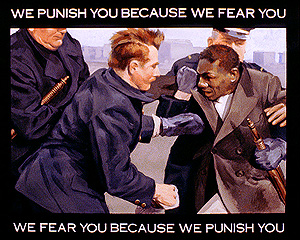 Neurosis - War, 1997
|

